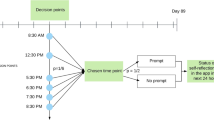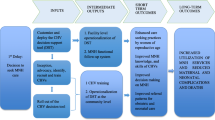Abstract
Mental health is a vast problem around the globe and is one of the key population health issues in the world today. At any given time, up to 6.8% of the world’s population suffers from a serious mental illness (SMI) such as schizophrenia or bipolar disorder. The impacts of SMI on a population are especially challenging in low and middle-income countries (LMIC). Mobile healthcare application research is a growing area of research aiming to ameliorate these challenging impacts. In Ghana, a LMIC in West Africa, mental healthcare systems are severely under-resourced and people with SMI often receive care from lay practitioners such as traditional and faith healers rather than trained mental health clinicians. These challenges exist alongside developed wireless infrastructure. In these contexts, mobile applications can substantially increase access to health information. This is the basis for our work developing a mobile health (mHealth) application to support mental health lay practitioners in Ghana. We describe the ways that our principled design research practice is intersecting with local faith-based practices, vernacular expertise and values, and the practicalities of technology adoption in Ghana.
Access this chapter
Tax calculation will be finalised at checkout
Purchases are for personal use only
Similar content being viewed by others
References
URL. https://www.cnet.com/news/using-androids-dark-mode-improves-battery-life-google-confirms-p/
Ardito, L., et al.: Effectiveness of Kotlin vs. Java in android app development Tasks.. Inf. Softw. Technol. 127, 106374 (2020). https://doi.org/10.1016/j.infsof.2020.106374.
Ben-Zeev, D.: Mobile health for mental health in west Africa: the case for Ghana. Psychiatr. Serv. 69(7), 741–743 (2018). https://doi.org/10.1176/appi.ps.201700555.
Ben-Zeev, D., et al.: Development of M-Healer: a digital toolkit to improve care and reduce human rights abuses against people with mental illness in West Africa. JMIR Mental Health 8(7), e28526 (2021)
Ben-Zeev, D., et al.: Feasibility, acceptability, and preliminary efficacy of a smartphone intervention for schizophrenia. Schizophrenia Bull. 40(6), 1244–1253 (2014)
Chibanda, D., Weiss, H.A., Verhey, R.: Effect of a primary care–based psychological intervention on symptoms of common mental disorders in Zimbabwe: a randomized clinical trial. JAMA 316(24), 2618–2626 (2016). https://doi.org/10.1001/jama.2016.19102
Donker, T., et al.: Smartphones for smarter delivery of mental health programs: a systematic review. J. Med. Internet Res. 15(11), 247 (2013). https://doi.org/10.2196/jmir.2791
Esan, O., et al.: A survey of traditional and faith healers providing mental health care in three sub-Saharan African countries. Soc. Psychiatry Psychiatr. Epidemiol. 54, 395–403 (2019). https://doi.org/10.1007/s00127-018-1630-y, PMID: 30456425
Firth, J., et al.: Can smartphone mental health interventions reduce symptoms of anxiety? A meta-analysis of randomized controlled trials. J. Affective Disord. 218, 15–22 (2017). https://doi.org/10.1016/j.jad.2017.04.046
Gureje, O., Lasebikan, V.: Use of mental health services in a developing country: results from the Nigerian survey of mental health and well-being. Soc. Psychiatr. Psychiatr. Epidemiol. 41(1), 44–49 (2006)
Gureje, O., et al.: The role of global traditional and complementary systems of medicine in the treatment of mental health disorders. Lancet Psychiatr. 2(2), 168–77 (2015)
Samba, D.: Ibadan, Nigeria, University College Hospital, Department of Psychiatry, Mental Health Leadership and Advocacy Programme (mhLAP). http://www.mhlap.org/country-of-activities/gambia (2012)
Johnson, K., et al.: Association of combatant status and sexual violence with health and mental health outcomes in postconflict Liberia. JAMA 300(6), 676–690 (2008)
Kessler, R.C., et al.: The global burden of mental disorders: an update from the WHO World Mental Health (WMH) surveys. Epidemiol. Psychiatr. Sci. 18(1), 23–33 (2009)
Kola, L., Abiona, D., Adefolarin, A., Ben-Zeev, D.: Mobile phone use and acceptability for the delivery of mental health information among perinatal adolescents in Nigeria: survey study JMIR Ment. Health 8(1) (2021). https://doi.org/10.2196/20314
Mburu, C.W., et al.: Co-designing with mothers and neonatal unit staff: use of technology to support mothers of preterm infants. In: Proceedings of the Second African Conference for Human Computer Interaction: Thriving Communities (AfriCHI 2018). Association for Computing Machinery, vol. Article 12. New York, NY, USA, pp. 1–10 (2018). https://doi.org/10.1145/3283458.3283487
Mobile Operating System Market Share Ghana. Accessed 25 Nov 2020. https://gs.statcounter.com/os-market-share/mobile/ghana
Ae-Ngibise, K., et al.: Whether you like it or not people with mental problems are going to go to them: a qualitative exploration into the widespread use of traditional and faith healers in the provision of mental health care in Ghana. Int. Rev. Psychiatr. 22(6), 558–567 (2010)
Norris, L., Swartz, L., Tomlinson, M.: Mobile phone technology for improved mental health care in South Africa: possibilities and challenges. South African J. Psychol. 43(3), 379–388 (2013). https://doi.org/10.1177/0081246313493376
Esan, O., et al.: Mental health care in Anglophone West Africa. Psychiatr. Serv. 65, 1084–1087 (2014)
Ofori-Atta, A., et al.: A situation analysis of mental health services and legislation in Ghana: challenges for transformation. African J. Psychiatr. 13(2), 99–108 (2010)
Read, U.: I want the one that will heal me completely so it won’t come back again: the limits of antipsychotic medication in rural Ghana. Transcultural Psychiatr. 49(3–4), 438–460 (2012)
Read, U.M., Adiibokah, E., Nyame, S.: Local suffering and the global discourse of mental health and human rights: an ethnographic study of responses to mental illness in rural Ghana. Globalization Health 5(1), 13 (2009)
Rey-Moreno, C., et al.: Co-designing a billing system for voice services in RuralSouth Africa: lessons Learned. In: Proceedings of the Fifth ACM Symposium on Computing for Development (ACM DEV-5 2014). New York, NY, USA: Association for Computing Machinery, pp. 83–92 (2014). https://doi.org/10.1145/2674377.2674389
Roberts, H.: A way forward for mental health care in Ghana? Lancet357, 1859 (2001)
Rusatira, J., et al.: Enabling access to medical and health education in Rwanda using mobile technology. Needs Assessment Dev. Mob. Med. Educator Apps JMIR Med. Educ. 2(1), e7 (2016). https://doi.org/10.2196/mededu.5336.. https://mededu.jmir.org/2016/1/e7
Sabiescu, A.G., et al.: Emerging spaces in community-based participatory design: reflections from two case studies. In: Proceedings of the 13th Participatory Design Conference: Research Papers 1. PDC 2014, pp. 1–10 (2014). https://doi.org/10.1145/2661435.2661446
Human Rights Watch. Living in chains: Shackling of people with psychosocial disabilities worldwide. ISBN: 978-1-62313-8653, 6 October 2020
Whiteford, H.A., et al.: Global burden of disease attributable to mental and substance use disorders: findings from the Global Burden of Disease Study 2010. Lancet 382(9904), 1575–1586 (2013)
Author information
Authors and Affiliations
Corresponding authors
Editor information
Editors and Affiliations
Rights and permissions
Copyright information
© 2021 Springer Nature Switzerland AG
About this paper
Cite this paper
Albright, L. et al. (2021). Co-Designing M-Healer: Supporting Lay Practitioner Mental Health Workers in Ghana. In: Stephanidis, C., Antona, M., Ntoa, S. (eds) HCI International 2021 - Late Breaking Posters. HCII 2021. Communications in Computer and Information Science, vol 1499. Springer, Cham. https://doi.org/10.1007/978-3-030-90179-0_16
Download citation
DOI: https://doi.org/10.1007/978-3-030-90179-0_16
Published:
Publisher Name: Springer, Cham
Print ISBN: 978-3-030-90178-3
Online ISBN: 978-3-030-90179-0
eBook Packages: Computer ScienceComputer Science (R0)




